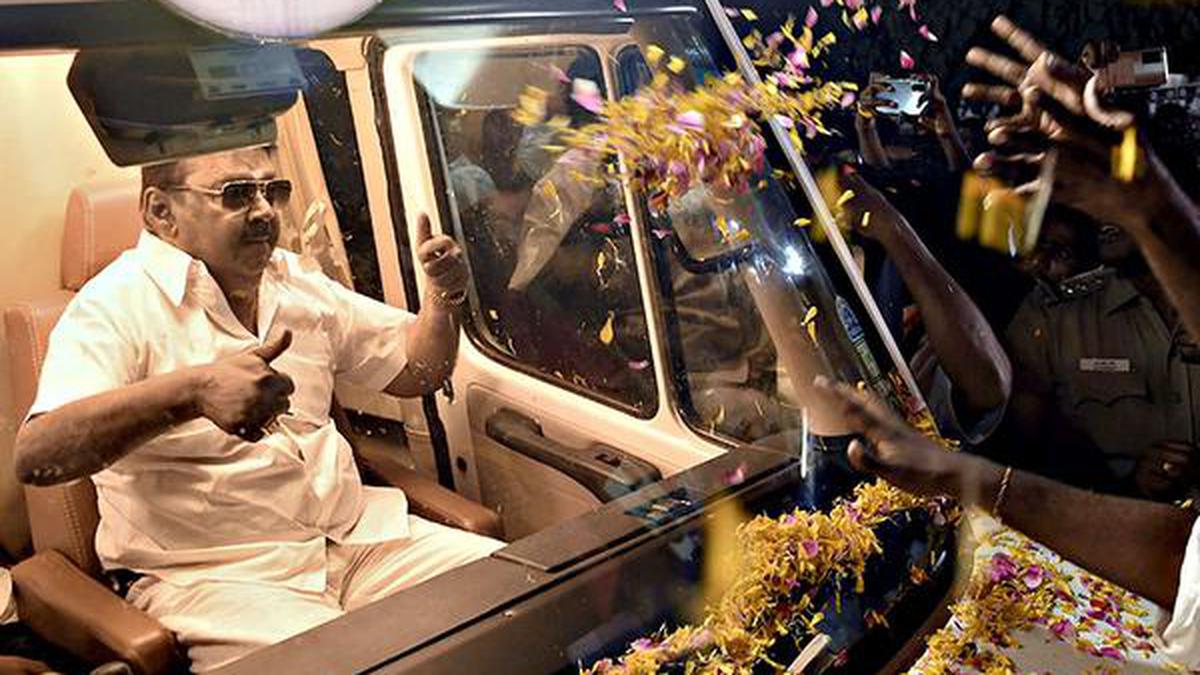
Charting the remarkable rise and fall of DMDK
The Hindu
DMDK: A party that started as an alternative to the Dravidian majors, but failed to sustain its presence in Tamil Nadu elections.
“I am the alternative now. They [people] have immense and spontaneous faith in me.” This was what DMDK founder Vijayakant told The Hindu a month before he launched the party in September 2005. True to his word, he made every effort in the initial years to present his party as an alternative to the principal players in Tamil Nadu — the DMK and the AIADMK.
However, the subsequent turn of events showed that he could not sustain his party as a force to reckon with. The DMDK came to be known as a spoiler in the 2006 and 2016 Assembly elections, apart from the 2009 Lok Sabha election. In 2006 and 2009, the DMDK fielded candidates in all constituencies. Barring Vijayakant, no other party nominee won in 2006, whereas the organisation did not win a single seat three years later. These two experiences perhaps made Vijayakant to abandon the path of going it alone in the State-wide elections and since 2011, the DMDK faced the elections only in the company of other parties, including the AIADMK on two occasions: the 2011 Assembly election and the 2019 Lok Sabha election.
In the 2006 election, the DMK and the AIADMK had direct contests in 115 constituencies, of which the DMK bagged 81 and the AIADMK 34. In 63 constituencies, the DMDK’s vote share was higher than the victory margin. Though its overall vote share was about 8.4%, the party secured a double-digit vote share in seven districts, and missed the 10%-mark narrowly in Kancheepuram and Virudhunagar. Contrary to the popular perception that an alliance with the DMDK would have made a difference to the prospects of the AIADMK which lost power then, a post-poll study conducted by the Centre for the Study of Developing Societies (CSDS) revealed that less than 25% of Vijayakant’s supporters backed the AIADMK in the 2004 Lok Sabha poll and well over two-thirds of those who had voted for the DMDK in 2006 favoured the DMK alliance two years earlier.
Again, in the 2009 Lok Sabha poll when the DMDK contested independently and netted 10.1%, its presence made a difference positively to the DMK-led front in 13 constituencies and to the AIADMK-led alliance in 11. In all these seats, the DMDK secured more votes than the respective victory margins.
After striking a deal with the AIADMK for the 2011 Assembly poll and winning 29 seats, the DMDK parted ways with that party. Vijayakant chose to field his nominee in the Sankarankovil by-election in March 2012 when his party forfeited a deposit with a vote share of 7.6%. Two years later, the DMDK was part of the NDA that consisted of the BJP, the PMK, and the MDMK. Though the NDA put up a creditable performance with an 18.6% vote share and bagged two seats, the DMDK, the lead constituent with its candidates in the maximum number of seats (14), did not win even a single seat.
Two years later, when many thought that the DMDK would join hands with the DMK, Vijayakant sprang a surprise by becoming a part of the People’s Welfare Front, which had two Left parties, MDMK and TMC (Moopanar). Out of 104 constituencies, it contested the DMDK forfeited deposits in all but one. Vijayakant lost a deposit in Ulundurpet, which turned out to be his last electoral battle. The party’s vote share was down to around 2.4%
In 2019, it was yet another disastrous performance for the DMDK, which went back to the AIADMK’s fold and contested four seats unsuccessfully. This time, its vote share remained at about 2.2%. Two years later, the party walked out of the AIADMK-led coalition and faced the Assembly election as an ally of the AMMK. It forfeited deposit in all the 60 seats it fielded its nominees with a vote share of barely 0.4%

The girl, who was admitted to Aster CMI Hospital with alarming breathlessness and significant pallor, was diagnosed with Wegener’s Granulomatosis (now known as Granulomatosis with Polyangiitis or GPA), a rare autoimmune condition that causes spontaneous bleeding in the lungs, leading to acute respiratory failure.

ACB files case against IPS officer N. Sanjay in Andhra Pradesh. The official is accused of manipulating the tender processes for awarding contract for development and maintenance of AGNI-NOC portal, and conducting awareness meetings for SC/STs. It is alleged that the total value of properties stolen, or involved in the case is estimated at ₹1,75,86,600.









